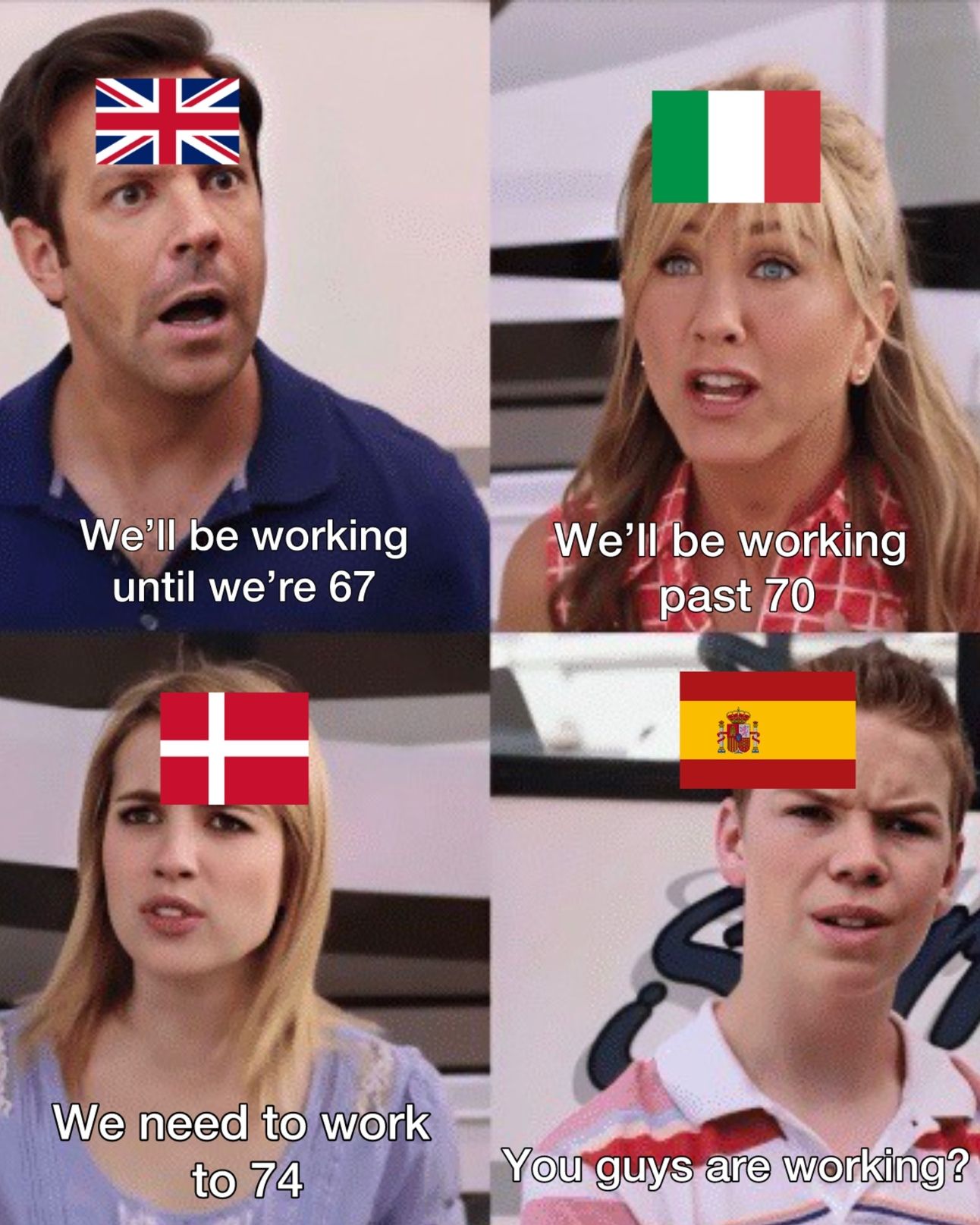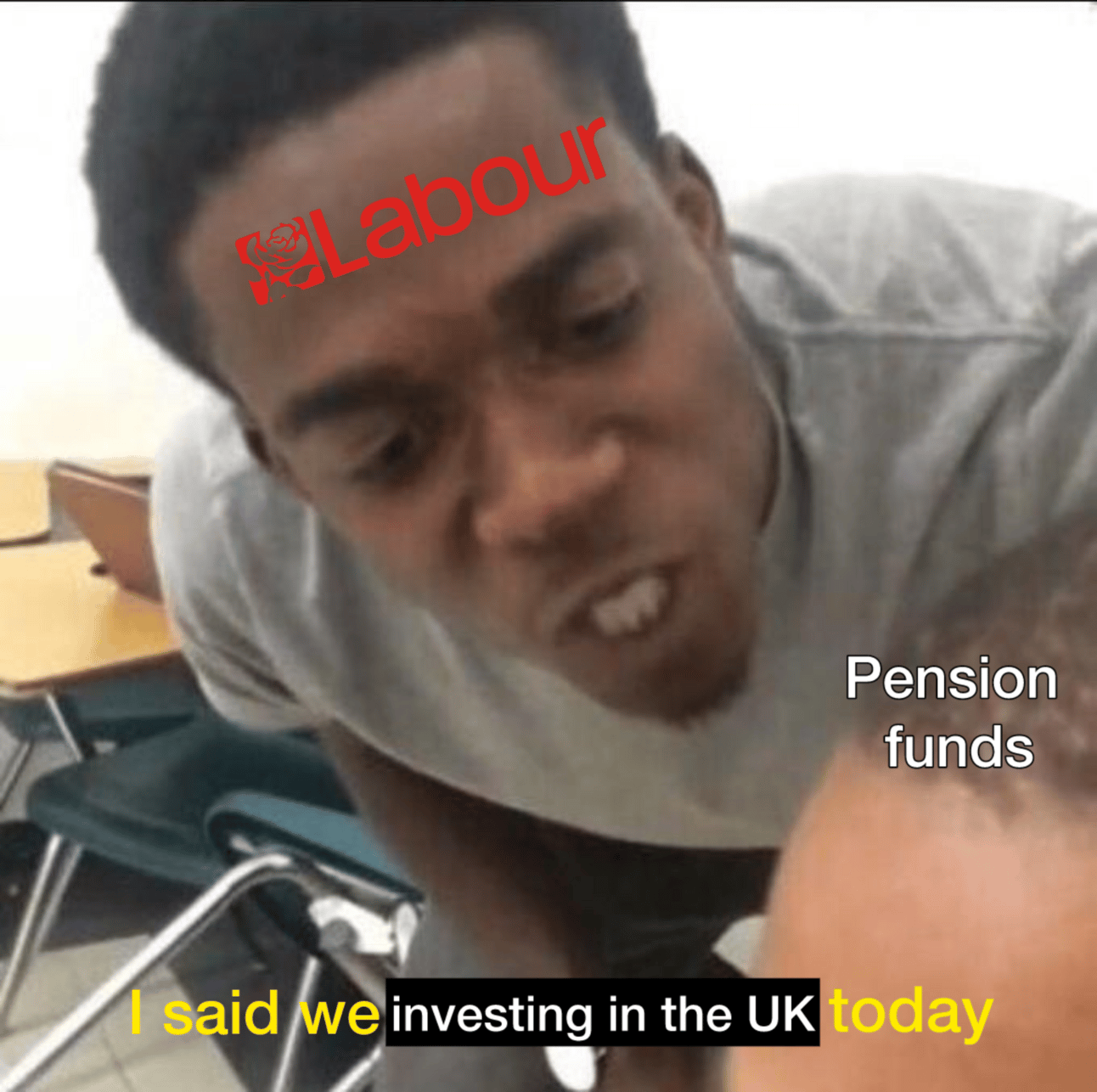Start learning AI in 2025
Keeping up with AI is hard – we get it!
That’s why over 1M professionals read Superhuman AI to stay ahead.
Get daily AI news, tools, and tutorials
Learn new AI skills you can use at work in 3 mins a day
Become 10X more productive

Bonjour lovely people,
At the start of the year, we were laughed out of the room when we proposed a meme-news desk to countless mainstream publications.
So we said fuck it, let’s just do it ourselves.
Now thousands of you read The Pint each week, and we’re hoping to bump those numbers up in the next few months.
So if you have some friends who you (mercifully) haven’t told about us yet, go and do it now.
But first, let’s get you your weekly roundup of the business and politics news you need to know.
⏰ Today's reading time is 5 minutes
Quote of the Week
“Speed has never killed anyone. Suddenly becoming stationary, that's what gets you.”
Duolingo CEO walks back AI-first comments

After a bold “AI-first” declaration, language learning app Duolingo’s CEO Luis von Ahn has backtracked, clarifying that AI won’t replace employees but will be used to “enhance” productivity. The statement follows backlash to a previous memo that implied hiring would take a back seat to AI implementation.
Users criticised new AI-generated courses as lower quality and complained about the shitty AI customer support, with Duolingo wiped much of its beautifully deranged social media presence amid the controversy.
Von Ahn has since acknowledged missteps in communication and reaffirmed support for employees through workshops and training, stressing that AI will be a tool—not a substitute—for human creativity.
I mean, good luck getting AI to replicate some of the weird shit that owl gets up to.
Duolingo’s retreat mirrors a growing pattern in the tech world.
Klarna, once praised for using AI to replace 700 customer service jobs, is now changing its tune. CEO Sebastian Siemiatkowski recently admitted they overcorrected and are hiring again, recognising the painfully obvious reality that AI isn’t yet at the level where it can replace the human touch.
One thing it is great for is as a cash-burning smokescreen for swathes of Indian developers pretending to be “sophisticated AI agents”.
Trump's tariffs temporarily reinstated as court considers White House appeal

Another week, another tariff’s headline…
A US federal appeals court has temporarily reinstated President Donald Trump’s sweeping tariff policy, overturning a lower trade court's ruling that questioned his authority to impose tariffs on nearly every country.
The Court of International Trade had ordered the White House to halt the tariffs within 10 days.
Just as the champagne corks were popping and The Economist’s head office was getting freakier than a Diddy party, a Federal appeals court accepted the government’s motion to keep the tariffs in place while it reviews the case further.
Though the Orange Maniac himself has not commented publicly, White House trade advisor Peter Navajo Navarro has hinted the administration's readiness to escalate the case to the Supreme Court, framing it as a constitutional battle over presidential powers in trade policy.
It’s worth noting that tariffs on steel, cars and aluminium remain unaffected by any of these developments.
Following the trade court's initial ruling, Asian markets surged—Japan’s Nikkei rose 1.9%, Hong Kong’s Hang Seng gained 1.1%, and South Korea’s Kospi jumped 1.8%.
European markets were a bit more muted, with the the FTSE 100 showing modest gains before flattening. US markets opened positively, with the Nasdaq up 1.1%, the S&P 500 up 0.9%, and the Dow Jones rising 0.2%.

Denmark to raise retirement age to the highest in Europe

Across Europe, retirement age reforms are triggering widespread debate and dissent, as Europeans start to realise that those leisurely lunch breaks and aperitivos aren’t going to magically pay for themselves.
Denmark, once a poster child for linking pension age to life expectancy, now faces union-led protests over plans to raise the retirement age to 70 by 2040 and potentially 74 by 2060.
Prime Minister Mette Frederiksen has responded to public frustration, questioning the fairness of indefinite working life extensions. Denmark already holds the EU’s highest retirement age, and trade unions argue this undermines the right to a “dignified senior life.”
This dilemma reflects a broader European trend.
Life expectancy is rising, prompting many governments to raise retirement ages to ensure pension system sustainability. According to the OECD, by 2060 the average retirement age in the EU is projected to be nearly 67, with some countries exceeding 70.
Alarmingly for the Nonno’s who love to hang out in the town square doing fuck all, even Italy’s retirement age is projected to reach 71.
Nordic nations like Denmark, Norway, and Iceland currently lead with retirement ages at 67. France’s still hovers closer to 62–64, and don’t you dare try to change it.
Data from Spain was inconclusive, as the respondents were having a siesta and unable to provide the relevant figures.
Ministers to get power to force pension funds to invest in UK

The UK government will introduce a “reserve power” allowing ministers to strong-arm compel pension funds to invest in British assets, a move that could significantly reshape the retirement industry.
Unveiled as part of the Pension Schemes Bill, the measure follows the Mansion House Accord—a voluntary agreement by 17 leading pension providers to channel £25 billion into UK private assets like infrastructure and start-ups by 2030.
However, the Treasury now signals a willingness to enforce investment targets if voluntary progress falters.
The power, while not yet activated, has sparked industry concern. Critics argue it risks clashing with pension trustees' fiduciary duty to act in the best interests of savers, rather than fulfilling political or economic agendas.
Aviva CEO Dame Amanda Blanc likened mandatory asset allocation to “using a sledgehammer to crack a nut.”
UK to spend billions on job training to cut reliance on migrant workers

The UK government has unveiled a record £3 billion plan to create 120,000 new training opportunities in sectors like construction, healthcare, engineering, and digital—part of a bold push to reduce dependence on foreign labour and upskill domestic workers.
With rising political pressure from anti-immigration Reform UK, Labour has paired this investment with tighter visa rules, costlier immigration charges and a vow to end the “open borders experiment.”
Britain’s track record on vocational training is pretty shit.
The Conservative government's apprenticeship levy, introduced in 2017, aimed to transform workplace training but actually led to a one-third drop in apprenticeship starts. Another resounding success notched by the Tories.
Small firms were stifled by bureaucracy and large employers mostly used the funds to retrain existing staff rather than recruit young people. Ed-tech companies like Multiverse started out as a “university-alternative”, but have sinced pivoted to upskilling already established employees.
Now, Labour’s proposed overhaul of the levy into a broader “growth and skills levy” risks repeating past mistakes.
Businesses support the idea in principle, but fear quality of the labour may decline.
Throw in the fact that there’s a record number of young people essentially doing nothing, and it could be the case of a policy that sounds great as a soundbite, but is actually very hard to implement in practice.
Elon Musk leaves White House but says DOGE will continue

Aspergers Tony Stark Elon Musk has stepped down from his role as a special government employee under the Trump administration, marking the end of his controversial tenure leading the Department of Government Efficiency (DOGE).
Originally pledging to slash $2 trillion in government spending, Musk later scaled back the target drastically after realising it was about as straightforward as trying to get all his children in the same room.
DOGE oversaw drastic federal workforce reductions, with an estimated 260,000 civilian jobs lost, with some reversals even ordered by federal courts after wrongful firings.
One particular area of government expenditure didn’t suffer from any DOGE intervention, but that’s by the by.
Musk faced mounting public scrutiny, including backlash tied to mass layoffs and operational errors, like staff cuts at the US nuclear program and devastating cuts to aid organisations like USAID.
The fallout has also hit Musk’s business interests. Tesla sales dropped 13% in Q1—the largest decline in its history—and stock prices took a hit amid basement-dweller activist-led boycotts and vandalism of vehicles.
Musk said he'd now refocus on his companies, pledging to stay at Tesla’s helm for at least five more years.
The news site that doesn’t cater to your beliefs. Or try to sell you theirs.
Instead, Ground News shows you how left, center, and right-leaning outlets are covering the same story—so you can easily compare reporting and get a well-rounded perspective on the issues that matter to you.
Join 1M+ readers from all political persuasions who use Ground News to see the news, the world, and themselves a little clearer.
🍻Half Pints
Quick-fire news you might have missed
Memes of the Week


Workplace Incident of the Week
Norwegian prosecutors have charged the navigator of a cargo ship with negligence after he allegedly fell asleep on duty and narrowly missed crashing the 200,000 tonne vessel into a home.
The homeowner Johan said he had slept through it, and only realised there was a ship in his garden when a neighbour started ringing the doorbell.
That’s all for today.
We’ll be back, bigger and better, next week.
Our mission is to carefully create, curate and craft the best memes to help you get up to speed with what’s happening in the world and have a few laughs whilst doing so.
We’re always open to feedback on improving the email, so let us know what you think in the poll below.
How was it for you?
Thanks to Ross and Laurence










